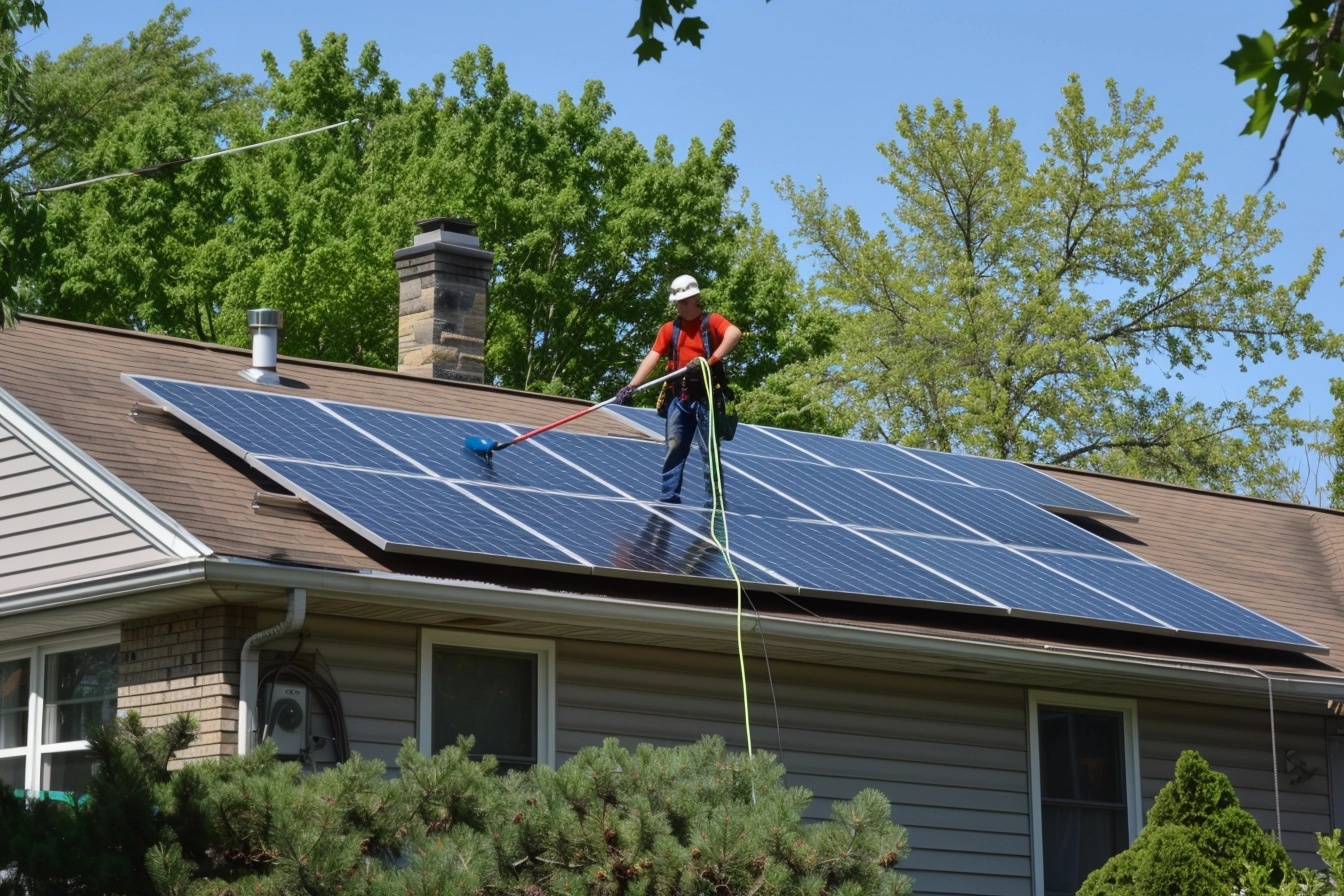
As solar energy continues to grow in popularity, more homeowners and businesses are turning their rooftops into renewable power stations. ☀️🔋 But there’s one factor that often gets overlooked when it comes to efficiency: cleanliness.
Dirty solar panels don’t just look bad—they perform worse. Dust, pollen, bird droppings, and other debris can significantly reduce their ability to generate electricity. That’s where power washing, when done carefully, can make a huge difference. In this article, we’ll break down everything you need to know about safely and effectively using power washing for solar panel maintenance. 💧⚡
⚠️ The Problem with Dirty Solar Panels
Solar panels rely on sunlight. When dirt and debris block the sun’s rays, the panel’s efficiency drops. Here’s what can interfere:
- Dust and airborne pollutants
- Pollen and tree sap
- Bird droppings and insects
- Leaves, ash, or mildew
- Salt (in coastal areas)
Studies have shown that dirty panels can lose 15% to 25% of their efficiency—or more in especially dusty or polluted environments. That translates to less energy and higher utility costs. 💸
🧽 Should You Power Wash Solar Panels?
The answer is: yes, but with caution.
Power washing can be a highly effective method for cleaning solar panels if done with the right settings and technique. These panels are built to withstand weather—rain, wind, even hail—but high-pressure water from the wrong angle or nozzle can damage seals, wiring, or coatings.
Browse Amazon Here For Soft Washing Equipment And Accessories
✅ Benefits of Power Washing Solar Panels
- Restores full solar efficiency ☀️
- Removes tough grime that rain can’t 💩
- Prevents long-term corrosion or staining
- Enhances curb appeal of rooftop systems
- Saves on energy bills with improved output 💡
🛠️ How to Power Wash Solar Panels Safely
✅ Step 1: Turn Off the System
Before starting any cleaning, turn off the solar panel system at the inverter and any shut-off switches. Safety first! 🔌
✅ Step 2: Use a Low-Pressure Setting
Do not use high-pressure jets directly on solar panels. Stick to soft wash settings or a pressure washer fitted with a wide fan tip (40° nozzle or greater). Aim for less than 1,200 PSI.
✅ Step 3: Choose the Right Cleaner
Avoid harsh chemicals. Use a mild soap or a solar panel-safe detergent. Some panels may even recommend distilled water only to avoid mineral deposits.
✅ Step 4: Rinse and Wash Gently
- Begin with a rinse from a distance
- Apply cleaning solution with a soft brush or extension wand
- Gently scrub tough spots
- Rinse thoroughly with clean water
✅ Step 5: Let Dry Naturally
Avoid drying with towels or rags—they can leave lint or streaks. Let the panels air-dry for a spot-free finish.
🚫 What to Avoid
- Do not use high-pressure jets up close
- Avoid abrasive brushes or scrub pads
- Do not stand on the panels (this can cause cracks or breakage)
- Don’t clean when panels are hot—early morning or evening is best to avoid thermal shock and streaking
🏠 Can You Power Wash from the Ground?
Yes! If you have the right equipment—such as a telescoping wand or water-fed pole—you can clean most residential systems from the ground or a stable ladder without ever stepping foot on your roof. This reduces risk and makes regular maintenance easier. 🪜🧼
🔧 Professional vs. DIY Cleaning
While many homeowners can clean their panels on their own, there are times when hiring a professional makes sense:
Hire a Pro If:
- You have a steep or high roof
- Your panels are heavily soiled or stained
- You’re unsure about handling electrical components
- You want long-term maintenance (bi-annual or quarterly cleanings)
Professional services often use deionized water systems and brushless tools that clean without damage or streaks. 💼
📆 How Often Should Solar Panels Be Cleaned?
It depends on your location and environment, but here’s a general guideline:
- Every 6–12 months for most homes
- Quarterly for dusty, industrial, or coastal areas
- After major events like storms, wildfires, or pollen season
Track your energy output—if you notice a dip in production, it may be time for a wash.
🧠 Fun Fact: Rain Isn’t Enough!
Many people assume rain keeps panels clean. While rain does help rinse off some debris, it doesn’t remove sticky substances like pollen, sap, or bird droppings. Plus, minerals in rainwater can leave spots that reduce clarity and efficiency. 🌧️
🏁 Final Thoughts
Keeping your solar panels clean is one of the easiest ways to protect your investment and maximize energy output. Power washing—done gently and correctly—can eliminate buildup and restore your panels to full working condition. ☀️💦
Whether you DIY with care or hire a pro, regular maintenance ensures your panels continue to do what they do best: harness the sun’s power to save you money and help the planet. 🌎⚡
Browse Amazon Here For Top Rated Power Washers And Accessories



